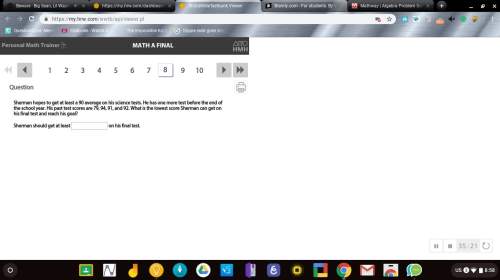
Mathematics, 03.07.2019 09:30 mandilynn22
Consider the following function. f(x) = 16-x^(2/3) find f(-64) and f(64). f(-64) = 0 f(64) = 0 find all values c in (-64, 64) such that f '(c) = 0. (enter your answers as a comma-separated list. if an answer does not exist, enter dne.) c = -64,64 based off of this information, what conclusions can be made about rolle's theorem? a. this contradicts rolle's theorem, since f is differentiable, f(-64) = f(64), and f '(c) = 0 exists, but c is not in (-64, 64). b. this does not contradict rolle's theorem, since f '(0) = 0, and 0 is in the interval (-64, 64). c. this contradicts rolle's theorem, since f(-64) = f(64), there should exist a number c in (-64, 64) such that f '(c) = 0. d. this does not contradict rolle's theorem, since f '(0) does not exist, and so f is not differentiable on (-64, 64). e. nothing can be concluded.

Answers: 1


Other questions on the subject: Mathematics

Mathematics, 21.06.2019 13:30, iicekingmann
What value of x is in the solution set of –5x – 15 > 10 + 20x?
Answers: 1


Mathematics, 21.06.2019 18:00, babydolltia28
Is a positive integer raised to a negative power always positive
Answers: 1
You know the right answer?
Consider the following function. f(x) = 16-x^(2/3) find f(-64) and f(64). f(-64) = 0 f(64) = 0 find...
Questions in other subjects:

Mathematics, 21.04.2020 17:55


Mathematics, 21.04.2020 17:56



Spanish, 21.04.2020 17:56







